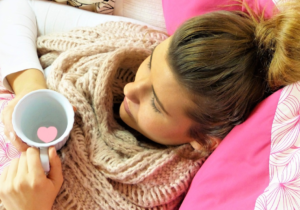I think its important to set out at the outset, that I am not a medical professional, im actually an accountant, who enjoys blogging and sharing useful content. I happened across this very useful article and though in the times we are facing, it was an opportune time to share in the event it could help somebody. Other supports and resources are available on www.speakyourmigraine.ie or from the Migraine Association’s website www.migraine.ie. It goes without saying always consult a medical professional if you have any concerns.
Migraine is Ireland’s fifth leading cause of disability, affecting over 10% of the population.[i]. Managing the condition can often feel like an uphill battle on any given day. Now, along with the usual symptoms and fears surrounding a chronic migraine attack, navigating our new ‘normal’ during COVID-19, brings additional challenges – from working at home and keeping the kids occupied to social distancing and drastic changes in daily routines.
Here are 6 simple tips and actions that can help you to manage your migraine during this uncertain period.
- Keep a Migraine Diary – Ensure you keep a migraine dairy that records the specific details of each of your migraine attacks. It can help to identify your triggers so you can take steps to prevent them before they happen.
- Pace yourself – plan out your days and try to stick to your usual routine as much as possible – wake-up, eat and go to sleep at the times you are used to doing so. Whether you’re now working from home or are managing with having the kids home from school, make sure to take regular breaks and don’t forget to save yourself some ‘me-time.’
- Stay hydrated! Dehydration leads to increased tiredness and fatigue, which can prompt an attack. While most of us acknowledge the concept of drinking six to eight glasses of water each day, the truth of the matter is that many of us don’t follow through on it. Having more time on your hands may make it easier to track your hydration levels throughout the day.
- Limit your screen time. Easier said than done perhaps but heightened exposure to news and/or social media during this difficult time could take a toll on our mental health. While it is important to stay well-informed, choose your sources of news and information carefully and be sure to allocate times to switch off completely from online life. If light is something that triggers your migraine too, minimizing exposure to blue-light rays from screens is very important.
- Stay active. Remember that getting some fresh air, whether it be on a walk or even in the comfort of your own garden, is important in maintaining a clear mind and reducing stress levels. If you can’t get out, you may find using at-home exercise equipment or check out the wide choice of free exercise classes that are available on-line.
- Check your medication. Make sure you have enough to hand without stockpiling unnecessary supplies.
- Identify your potential migraine triggers. Make a conscious effort to avoid stimulants such as loud noises and bright lights, and pay attention to your food and drink choices. Keep a migraine diary to track what triggers your migraines. This can help you see a pattern in your migraine occurrences and will make avoiding one easier.
Migraine diaries are available through the Migraine Association of Ireland or by downloading the free Migraine Buddy app. As noted above other supports and resources are available on www.speakyourmigraine.ie or from the Migraine Association’s website www.migraine.ie.
Please be advised to talk to your doctor or pharmacist should you have any concerns about your migraine management. Thank you to Novartis for allowing me to reproduce the above.



No Comments